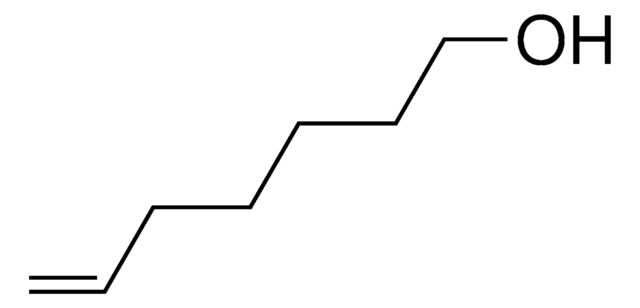About This Item
Recommended Products
assay
97%
refractive index
n20/D 1.447 (lit.)
bp
234-238 °C (lit.)
density
0.876 g/mL at 25 °C (lit.)
SMILES string
OCCCCCCCCC=C
InChI
1S/C10H20O/c1-2-3-4-5-6-7-8-9-10-11/h2,11H,1,3-10H2
InChI key
QGFSQVPRCWJZQK-UHFFFAOYSA-N
Looking for similar products? Visit Product Comparison Guide
Related Categories
General description
Application
signalword
Warning
hcodes
Hazard Classifications
Eye Irrit. 2 - Skin Irrit. 2 - STOT SE 3
target_organs
Respiratory system
Storage Class
11 - Combustible Solids
wgk_germany
WGK 2
flash_point_f
210.2 °F - closed cup
flash_point_c
99 °C - closed cup
ppe
dust mask type N95 (US), Eyeshields, Gloves
Certificates of Analysis (COA)
Search for Certificates of Analysis (COA) by entering the products Lot/Batch Number. Lot and Batch Numbers can be found on a product’s label following the words ‘Lot’ or ‘Batch’.
Already Own This Product?
Find documentation for the products that you have recently purchased in the Document Library.
Customers Also Viewed
Our team of scientists has experience in all areas of research including Life Science, Material Science, Chemical Synthesis, Chromatography, Analytical and many others.
Contact Technical Service











